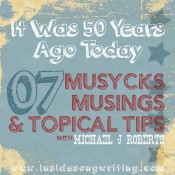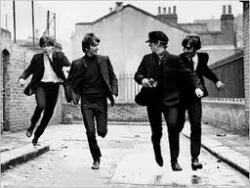Musycks Musings & Topical Tips 07: It Was 50 Years Ago Today

It Was 50 Years Ago Today
A weekly column by Inside Songwriting contributor, Michael J Roberts.
July 6 1964, the world premiere of A Hard Day’s Night not only gave a besotted world another chance to embrace the lovable Liverpool mop-tops, this time on celluloid, it marked a quantum leap in the art of the musical. The Beatles and their collaborators pushed the boundaries of the form and re-imagined what a contemporary musical could achieve and 50 years on it remains a landmark in film history. It also represented the first time the key writing team of John Lennon and Paul McCartney would provide all the songs for the film and the accompanying album and it can be seen as a watershed in their astonishing early career. As quickly as mid 1964 it was accepted that John and Paul were always ambitious and gifted songwriters, an angle their canny manager promoted at every turn, but was this the truth?
“there were ‘undred’s of ‘em”
The myths surrounding their song writing were trotted out so early and so often in the wake of their spectacular rise that some crucial assumptions have become ‘holy writ’, but in the wake of Mark Lewisohn’s superbly detailed book, All These Years, Volume 1 -Tune In, some of these assumptions should be overturned. The ‘received’ history is something that sees our heroes, John and Paul, writing their little backsides off in an attempt to be successful writers, Paul often said the pair “sagged off” school to write and further “there were ‘undred’s of ‘em”. Lewisohn turns an historian’s dispassionate eye on the story and finds it wanting, as he does with the other key plank of their early mythology, that George Martin signed them to EMI, not so, on both counts.
Epstein’s Flair
The key driver in John and Paul’s rise as writers du jour was Brian Epstein. Brian’s had a theatrical background and flair, instinctively realising that John and Paul’s few original songs made them stand out from an increasingly crowded English band scene. Brian took the band on in late 1961 and was promptly rejected by every record label in London, including by George Martin and his EMI subsidiary Parlophone. Brian’s championing of the boys original songs led directly to Ardmore and Beechwood, the publishing arm of EMI, talking the record company into recording 4 sides so that the publishing could be exploited by the EMI sister company. EMI promptly palmed the job to Martin’s label, home to an amazing array of musical and comedy acts, and it uncertain if Martin himself would even bother to show up for the session, given he’d personally turned them down.
“gentlemen, you’ve just made your first number one”
George Martin was won over, not by their songs, (which he thought unremarkable) but by their ‘shtick’, the collective charm of Lennon, McCartney and George Harrison, three exuberant young men, whose energy and wit generally won him over to the Beatle cause. Martin was charged with committing the four songs Ardmore and Beechwood had signed, Love Me Do amongst them, to tape. Martin judged that song the most commercial and released it, surprised by its chart showing, which owed a lot to the huge Liverpool following the boys had built up. The single did well enough for Martin to have more confidence in the follow up, but he had only to contractually release one more single to fulfil EMI’s obligation of four sides. Unimpressed by the Lennon and McCartney options, he opted for a professional Denmark Street writer named Mitch Miller and his jaunty pop song called How Do You Do It? The band rebelled by recording a half-assed version of the tune, and Lennon talked up one of his own modelled on Roy Orbison, a song called Please, Please Me. The boys played with the tempo and arrangement and by the time they did the final take Martin was fully on board, “gentlemen, you’ve just made your first number one”.
Rather than “hundreds” of options, Martin had less than half a dozen, and the first single and its B side had used up two! In a document uncovered by Lewisohn in the files of Polydor in Germany the young writers concocted their own ‘biography’ for use in exploiting their first recording, the songs they did with Tony Sheridan over a year before they recorded for EMI. Paul wrote of himself “songs written with John Lennon – around 70 songs”, but John wrote “written a couple of songs with Paul”. No doubt the lads had bits and pieces done, and quite a few finished songs, but it seems the standard Lennon set might have been higher than McCartney’s? Either way they seemed to agree that a song had to be of a certain standard before they’d include it into their Beatle set, and they were hesitant to push second rate songs.
The stunning and rapid success of the band after Please, Please Me, led to them being considered as serious writers, a situation that suited Epstein’s ambitions for the pair. He was now pushing them to write at every opportunity and the confidence and encouragement they got from him sparked a flood of quality songs that Brian could never have imagined. Major music critics were soon calling them the “greatest writers since Shubert” and praising their “Aeolian cadences”, and the myth started that they were always prolific and serious song writers. The truth was they dabbled and had talent, but prior to Brian the band played barely a handful of Lennon and McCartney tunes as the lads were almost embarrassed to play their own songs in place of their prized American R&B covers.
A decisive moment on Denmark St.
It’s clear that the boys embraced the opportunity to write their own songs, an unprecedented development in their rapid rise as pop stars and as a result of their flair and success with this side of the equation changed song writing forever. One of Brian’s most astute early decisions was to set up a publishing company for Lennon and McCartney’s catalogue, Northern Songs, administered by a canny old Denmark Street operative, Dick James. This led to a paradigm shift within the industry that reverberated around the world. Simply put, before The Beatles it was uncommon for songs to be supplied by the artists, for over 70 years the music publishing business evolved around a model of ‘professional’ writers supplying material for bands and singers, but after The Beatles every serious artist needed to also write their own songs to be considered relevant. That Lennon and McCartney got the chance to write was amazing enough, that they rose to the challenge so well is miraculous.
The Beatles All These Years Part 1
Lewisohn uses the historian’s art and discipline, of favouring primary sources and documents and unpacks the issues with an unmatched forensic flair. The story is scarcely believable at most levels, the stuff of dreams, a fable so amazing that simple assumptions crept through unchallenged, clinging to the narrative like rusted on crustaceans carried along on a beautiful clipper – we’re so distracted by the sleek lines and form of the boat we don’t look too closely at the dirty underneath. This fresh perspective does not at all diminish the achievements of John and Paul; it actually makes them all the more remarkable.
For more insight into that incredible time you should watch and enjoy their superb feature film, A Hard Day’s Night, and read my detailed review, A Day and a Half in The Life, here.
Musycks
Stay tuned for news on Michael’s forthcoming brilliant book
“Becoming A Great Songwriter”
more eBOOKS by MICHAEL J ROBERTS
RELATED POSTS / LINKS:
Musycks Musings & Topical Tips Home





